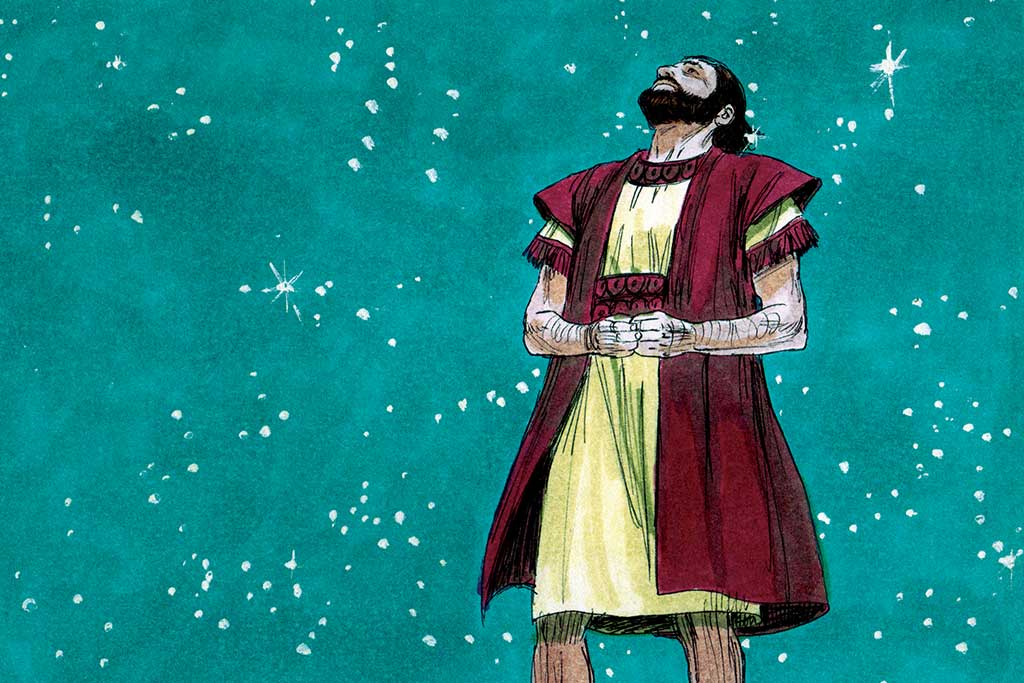
Sarah: Cultural Insights Offer a Fresh Perspective
The character of Sarah in the Bible is an interesting one. We know a few things about her, namely, that she was the beautiful and beloved wife of Abraham, the mother of the nation of Israel, and the spiritual mother of all who believe in God.
But Sarah sometimes gets a bad reputation among those who teach and read the Bible. Many of us know her primarily for the evidence that the Bible gives us that she was not a person of very strong faith. After all, God had told her and Abraham repeatedly that he was going to bless them with their own child, even in the face of their attempt to create an heir via their own means through Hagar. Still, evidently Sarah did not believe. In fact, she laughed when God told her that she would have this son in her old age. In Genesis 18:12 we read, “So Sarah laughed to herself as she thought, ‘After I am worn out and my lord is old, will I now have this pleasure?’”
Tsk Tsk . . . Oh Poor, Unbelieving Sarah
This story has set many millions of people to shaking their heads as they think to themselves, “Sarah, oh you of little faith. How could you possibly not believe God when he was telling you to your face that this miracle would indeed happen?”
First of all, let’s not get too judgmental about Sarah in particular. Abraham himself was caught up in the unbelievable nature of this promise, and he too chuckled in amazement as he considered the ramifications of what this promise would mean. Let’s look at the story in Genesis 17:
“God also said to Abraham, ‘As for Sarai your wife, you are no longer to call her Sarai; her name will be Sarah. I will bless her and will surely give you a son by her. I will bless her so that she will be the mother of nations; kings of peoples will come from her.’ Abraham fell facedown; he laughed and said to himself, ‘Will a son be born to a man a hundred years old? Will Sarah bear a child at the age of ninety?’” (Genesis 17:15-17).
As one-half of the couple receiving this promise from God, Sarah and Abraham had likely spent a lot of time marveling at the wonder of this situation. They likely smiled together many times as they considered what would have to happen for this promised miracle to be fulfilled.
For Sarah, this promise had physical implications that Abraham, who was able to have children long after his beloved wife died, didn’t have to consider. As the years wore on and Sarah’s body wore out, she obviously had to think about what it meant that she, an aged woman, would have to actually carry a baby within her very own tired body in order for God’s promise to be fulfilled. The natural process of menopause would have also given Sarah mental pause—if menstruation was a long-distant memory, how in the world was she supposed to carry a child?
Many women and couples can relate to the heartache that hopeful potential parents feel in the face of persistent infertility. But Sarah lived in a culture that didn’t fully understand the physical science behind fertility, so for her as the wife of a prominent husband, this reality was especially painful. The NIV Cultural Backgrounds Study Bible’s notes on Genesis 11:30 give us a glimpse into the mind and emotions of this would-be mother as she struggled with her own heartache:
Genesis 11:30 Sarai … was not able to conceive. Barrenness was considered a judgment from God in the ancient world. Ancient peoples did not yet understand the physiology associated with fertilization. They viewed the woman as a receptacle for male seed. Rather than supplying an egg to be fertilized, the woman was seen simply as an incubator for the child. Therefore, if man provided the seed at the proper time (they understood that timing was in relation to menstruation) and nothing came of it, the woman was seen to be a faulty incubator.
But this defect would not be seen as simply a physical problem, since no illness, symptom or condition was simply physical. Deity was responsible for creation in the womb, and deity was the one who opened the womb.
Sarai’s barrenness would have potentially resulted in a fragile marriage (since failure to deliver children to the family was the most common cause of divorce), in societal shame (since her condition would appear to be the result of having angered a god so that she was therefore unable to fulfill her societal role), and in an uncertainty for the afterlife (since descendants were believed to sustain the deceased in the netherworld). In Abraham and Sarai’s case, it also presented quite an obstacle to the covenant promise of having many descendants (Genesis 12:2; 15:5).
Can Sarah be blamed for wondering how this promise was going to be fulfilled? How hard would it be for anyone in today’s world to believe that a woman who had never had a child, who was probably housed in assisted living with her aged husband, would ever carry a child? Not to mention how this woman, who had likely hardly ever carried a child in her arms, would somehow get pregnant and be able to look forward to bouncing an energetic baby boy on her bony knee. The very idea seems laughable. So Abraham and Sarah laughed. Who of us wouldn’t do the same?
Sarah: A Different Perspective
The notes in the NIV Cultural Backgrounds Study Bible point us toward a fascinating conclusion as far as Abraham and Sarah are concerned. This Bible, which has been designed with notes and other helps to bring readers into a deeper understanding of the cultural contexts of the Bible’s teachings and stories, shows us what the first hearers of this story may have understood. It gives us a very different perspective of why Sarah may have laughed in the story that we find in Genesis 18.
Let’s first look at that story:
The Lord appeared to Abraham near the great trees of Mamre while he was sitting at the entrance to his tent in the heat of the day. Abraham looked up and saw three men standing nearby. When he saw them, he hurried from the entrance of his tent to meet them and bowed low to the ground.
He said, “If I have found favor in your eyes, my lord, do not pass your servant by. Let a little water be brought, and then you may all wash your feet and rest under this tree. Let me get you something to eat, so you can be refreshed and then go on your way—now that you have come to your servant.”
“Very well,” they answered, “do as you say.”
So Abraham hurried into the tent to Sarah. “Quick,” he said, “get three seahs of the finest flour and knead it and bake some bread.”
Then he ran to the herd and selected a choice, tender calf and gave it to a servant, who hurried to prepare it. He then brought some curds and milk and the calf that had been prepared, and set these before them. While they ate, he stood near them under a tree.
“Where is your wife Sarah?” they asked him.
“There, in the tent,” he said.
Then one of them said, “I will surely return to you about this time next year, and Sarah your wife will have a son.”
Now Sarah was listening at the entrance to the tent, which was behind him. Abraham and Sarah were already very old, and Sarah was past the age of childbearing. So Sarah laughed to herself as she thought, “After I am worn out and my lord is old, will I now have this pleasure?”
Then the Lord said to Abraham, “Why did Sarah laugh and say, ‘Will I really have a child, now that I am old?’ Is anything too hard for the Lord? I will return to you at the appointed time next year, and Sarah will have a son.”
Sarah was afraid, so she lied and said, “I did not laugh.”
But he said, “Yes, you did laugh.”
Again, many commentators take this story as a simple proof positive that Sarah’s faith was not what it should have been, and they use her as an example of an unbelieving woman who should have waited just a little bit longer for the God who had made these promises to deliver (no pun intended).
But let’s look at the notes from the NIV Cultural Backgrounds Study Bible on this story. Read these carefully as you look at the timing of the different verses, as outlined by the writers of this commentary (italics have been added for emphasis).
Genesis 18:9 Where is your wife Sarah? It could be inferred from the angel’s question that it was unusual for Sarah not to be there—either in a serving capacity or joining them in the meal (there is no evidence of women eating separately in the ancient world). It could also be inferred from Abraham’s curt response (“there, in the tent”) that this was not just the circumstance of the moment and that she could be sent for.
These are not necessary inferences, but there is a possibility that something is indicated here that was transparent to the Israelite reader, yet elusive to us. That is, it is possible that Sarah has had to retreat to the tent and is now confined there—that she has suddenly, much to her shock and consternation, become “indisposed.” Menstruation rendered a woman unclean in the ancient world and would have prohibited her from social contact and from food preparation and serving.
The text specifically indicates that she had already gone through menopause (verse 11), but if she were to bear a child, her period would need to restart.
The timing would have to be precise here. In v. 6 Abraham asked Sarah to bake some bread, an activity often forbidden to menstruating women in Abraham’s time, so at that point her period had not begun. Yet she would not be confined to her tent unless she actually had her period. If this is the issue, she experienced the onset of her period as dinner is being served.
We know even from the Biblical narratives that menstruating women were at times confined to their tents (cf. Genesis 31:34–35). This view is also attested in the ancient Near East. Though somewhat speculative, this line of thinking would explain why the announcement that Sarah would bear a child is introduced by a question concerning Sarah’s whereabouts, leading the somewhat embarrassed Abraham to offer the euphemistic explanation that she is “in the tent” as a way of explaining that she is indisposed (note our modern euphemism, “it’s that time of the month”).
One could almost imagine a transitional, “Indeed, and that is just the beginning …” It would have constituted a remarkable sign of the resumption of her fertility.
The Implications of Sarah’s Return to Fertility
How many pastors—especially male pastors, who have never experienced the physical manifestations of menstruation—have ever thought of this reason for Sarah’s being indisposed when the angel asked Abraham where she was? And how amazing is it that the original hearers of this story might have inferred from Sarah being suddenly confined to the tents that this 90-year-old woman’s menstrual cycle would have restarted shortly after she heard this promise once again?
For most people, prayers and promises are rarely answered immediately. Quite often we make our requests to God and wait, patiently or impatiently, for him to answer or to act on our behalf. But if the timing of these observations is correct, the implication is that after Sarah heard this promise yet again, she actually felt the potential of that promise coming true within her very own body, as she physically felt her reproductive system restart.
Imagine her surprise as she found herself suddenly “unclean” after decades of not experiencing the effects of this process. And imagine her laughter as she finally understood, because of the re-emergence of this process in her own body, that God’s promise would indeed be fulfilled, as she and Abraham had long understood.
Let’s look at the last few verses of the story again:
Then the Lord said to Abraham, “Why did Sarah laugh and say, ‘Will I really have a child, now that I am old?’ Is anything too hard for the Lord? I will return to you at the appointed time next year, and Sarah will have a son.”
Sarah was afraid, so she lied and said, “I did not laugh.”
But he said, “Yes, you did laugh.”
Is Sarah’s statement above perhaps one of delighted surprise in the face of her own physical re-emergence as a potential mother? Of her amazement and amusement as she imagined what it would feel like to carry this child of promise within her very own womb?
And what about God’s statement in the last verse above? Can we somehow see this differently in the light of what the original hearers of this story would have understood? Perhaps God’s statement in the last verse is more one of insider knowledge into the mind and heart of this suddenly befuddled and delighted nonagenarian. Maybe he looked at his precious Sarah, who had waited for so many years for the fulfillment of this promise, and smiled and winked at her and said, knowingly, “Yes, you did laugh.”
What If?
The timing and background of this alternate understanding of the story—whether or not any of it actually happened this way—is, of course, up for debate and impossible to prove either way. But it does give modern readers a different perspective on a very familiar story. And it helps us understand this character in a different light than we may have before.
The potential expansion of our understanding, as outlined in the commentary above, can deepen our desire to learn more about what this ancient book is all about. If this story has these different potential implications, what about all of the other stories we’ve read for years in the Bible? Could there be some depth of understanding that we in the modern world have yet to plumb?
After all, as the introduction to the NIV Cultural Backgrounds Study Bible explains, “the Bible was written for us, but it was not necessarily written to us.” There are stories in the Bible that we take at face value and interpret with our modern sensibilities that may have all kinds of implications when one considers the cultural and societal norms under which the characters of the stories lived. Their world was much different from ours; they had assumptions about the ways of God that distracted, hurried people living in the 21st century can hardly begin to understand unless we do the work to uncover it ourselves.
It’s fascinating to consider the possibilities here, that many of these stories that we’ve heard so often and thought we had completely understood, could have implications that we have never even begun to consider. Isn’t it? Sarah’s experience is certainly something that many modern readers can relate to.
The notes and commentary above have a humanizing effect, to be sure, as we consider what Sarah was going through when all of this happened. After all, we know that she actually, really did have this beloved child. She did bounce him on her bony knee. And while she did, she likely laughed time and time and time again.
Some of the content in this article is drawn from the NIV Cultural Backgrounds Study Bible.
By Mike Vander Klipp, a senior editor with the Zondervan Bible Group, where he’s been privileged to work for the past three decades. He and his family live in Grand Rapids, Michigan.

Cultural Backgrounds Study Bible
The NIV Cultural Backgrounds Study Bible brings the ancient world of Scripture to life for modern readers through hundreds of articles, color photos, charts, maps, and more on the customs, culture and literature of biblical times.
Learn More





